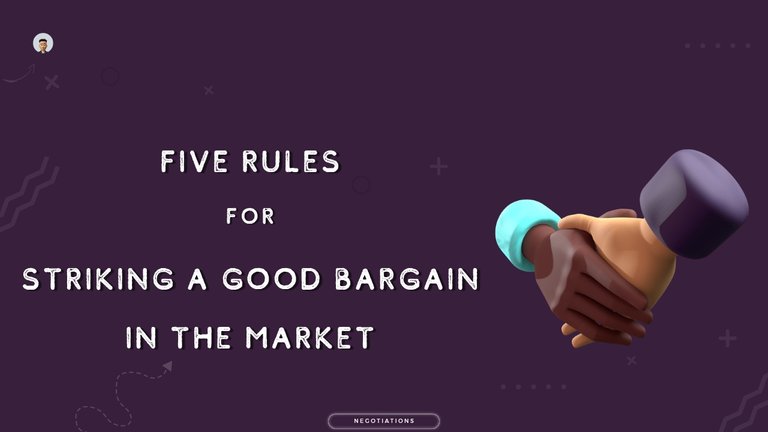5 Rules for Striking a Good Bargain in the Market
Everybody naturally wants to win and, even more so, make the most of their win. And in business, no one likes to be the loser. When it comes to making an agreement with another party on the cost of a service or product, it is important to be able to strike a good deal, or else one may end up paying more than they should have. However, on the streets where I grew up, it takes another level of expertise to be able to strike a good bargain. I will be sharing a few rules I follow to make the best deals I can in the crazy market of Nigeria.

There is something peculiar about some Nigerian mothers. An experience with their bargaining skills in the market is something that one may cringe over and feel pity for the seller. They can be very skilled at beating prices down to their satisfaction. And trust me, their satisfaction may very well be identical to mercilessness.
Of course, I do not mean "merciless" in the literal sense. The seller still reserves the right to accept the bargain or not. It is just that there are techniques for striking a good bargain. And the escapades of following my mother everywhere as a kid allowed me to pick up one or two things from her.
Rule One: Search deeper
To make a good deal, patronizing the sellers at the forefront of the battlefield (the market) can prove very futile. It is much easier to negotiate with the sellers who are not stationed at the forefront but rather at a place much deeper.
The logic is that it's easier for people to reach them, therefore making their expenses to keep their spaces even higher. It eventually reflects on the prices, and that makes it even harder to get a good deal because they factor in their expenses to provide the product into the entire cost. Instead, the ones much deeper in the market have less rent, which is easier to deal with because their prices might be better.
Rule Two: Never look desperate
If your seller can see that you truly need their product, pride sets in. This makes them set rigid prices that are mostly bad deals. If they can see it in your eyes that you want it so badly, then making a good deal with them may very well be difficult.
The trick is to pretend like it's something that one "wants to get" and not "needs to get." Even though some products are clearly "needed," the idea is to not let the seller think that. When you make an offer (stating a price) and they seem to be stubborn still, it is sometimes futile to keep waiting. They'd automatically think one's desperate about that product and therefore remain adamant on their price.

Rule Three: Start making an offer at around 40% of the seller's price
Everyone loves profits. It is sometimes why we start businesses. We also love to make the most profit we can. This often results in people spiking their prices. One has to then make an offer that is really low.
You see, speaking of making offers, these sellers are often prepared. They expect to meet customers that may want to beat the price down, so they raise it very high so that the buyers that may try to beat it down would only do so to the point of their preferred price.
This is why starting off at a really low price, say 40% of the seller's price, is a good strategy. It shows that one is serious about buying but not interested in paying what the seller is asking. This usually leads to a negotiation where both parties land somewhere in the middle, although one has to be tactful in their dialogue with the seller to keep the negotiation healthy.
Rule Four: Be Prepared to Walk Away
Sometimes, no matter how hard one tries, they may not be able to strike a good deal. In times like this, it is important to know when to talk away. Walking away not only gets the seller to lower their price, but it also keeps one from striking a bad deal.
When the seller sees that you do not agree with their price, are no longer interested in further negotiation, and are willing to leave, they may either immediately change their mind or call you back to reconsider. If they call back to reconsider, then your preferred price works just fine for them—even though they may still want to persuade a little longer. In other cases, the seller may just never call you back: either your price is a bad deal for them or their just being adamant. Either way, be prepared to walk away.

Rule Five: Leverage the general market to find the right price
Sometimes, one could be unsure about the ideal price to pay for certain products or services. To avoid starting off at the wrong price for a negotiation, one could go around and experiment with even lower prices than the 40% mark.
This may seem very absurd, but remember that people may just spike up their prices so as to influence a customer's perceived value pricing and make them start off at the wrong price for negotiation. If one can take a few minutes to experiment a little bit, especially in a market with many vendors, one may be able to deduce from their reactions where the starting price should be.

Bargaining in a market can be a daunting task. However, with the right strategies, one can navigate their way to ensuring that they don't look back after a couple of hours or days and feel they made a bad deal. Remember to search deeper, never look desperate, start with a low offer, be prepared to walk away, and leverage the general market to find the right price. With these rules, one can navigate the crazy Nigerian market and come out with a great deal.
Posted Using LeoFinance Beta

Rule #4 that you mentioned is where I always struggle with. I know that they are doing the business and sometimes the guilt of disturbing them by asking to low down their price is quite shameful on my side ( most likely it is by culture not 100% sure about it though) but if I feel that I can still find the product at a different shop then I try to inform the seller that it is not really within my budget and I will try to search for more.
Nowadays, bargaining to sellers is quite hard as most are still recovering from their financial losses due to the pandemic.
Of course, it does sound like one is being inconsiderate by asking them to lower the price. The thing, however, is that most people in the market are never fair, so they tend to give exuberant prices in hopes to exploit unsuspecting customers. Asking them to lower their price is worth a try. There should be an agreement between both parties, you know. It's worth a try. The worst they can do is reject (or be hostile), in which case you know you aren't making a bad deal anyway.
Congratulations @olujay! You have completed the following achievement on the Hive blockchain And have been rewarded with New badge(s)
Your next target is to reach 13000 upvotes.
You can view your badges on your board and compare yourself to others in the Ranking
If you no longer want to receive notifications, reply to this comment with the word
STOPTo support your work, I also upvoted your post!
Check out our last posts: